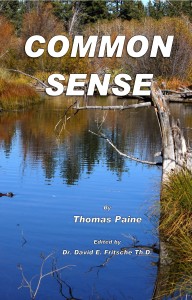The Spirit of Laws, Baron de Montesquieu
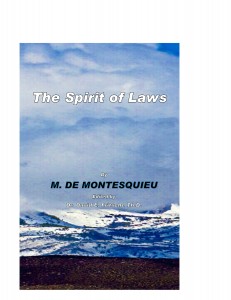 Montesquieu was considered the first government anthropologist. He studied historic societies and nations in an effort to discover why they fell from power and were replaced by a different form of government. He was credited with the concept of the separation of powers. He considered that all leaders have the capacity and tendency to accumulate power and to be corrupted by that quest. He proposed the separation of powers as a way to stop the accumulation of power and the use of excess power.
Montesquieu was considered the first government anthropologist. He studied historic societies and nations in an effort to discover why they fell from power and were replaced by a different form of government. He was credited with the concept of the separation of powers. He considered that all leaders have the capacity and tendency to accumulate power and to be corrupted by that quest. He proposed the separation of powers as a way to stop the accumulation of power and the use of excess power.
An Essay Concerning Human Understanding, John Locke
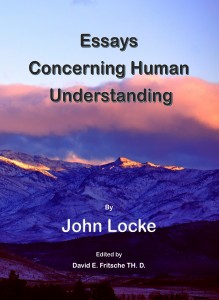 The writings of John Locke served as a strong element in the writing of the Federalist Papers and then of our American Constitution. He took up where Montesquieu left off in explain the need for the separation of powers and was a strong advocate of human rights. His view of social groups is that people shared graciously aw a part of the natural human experience when they are given individual and personal rights. His writing greatly influenced many of our Founding Fathers.
The writings of John Locke served as a strong element in the writing of the Federalist Papers and then of our American Constitution. He took up where Montesquieu left off in explain the need for the separation of powers and was a strong advocate of human rights. His view of social groups is that people shared graciously aw a part of the natural human experience when they are given individual and personal rights. His writing greatly influenced many of our Founding Fathers.
The Federalist Papers, Alexander Hamilton, James Madison, and John Jay
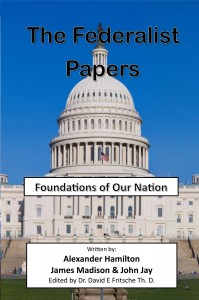 As our Founding Fathers gathered in New York to consider the writing of our constitution, they looked to Alexander Hamilton, James Madison, and John Jay as the scholars to research and present papers on the issues they discussed. This documents are a rich source of knowledge and wisdom as these three took up the issues discussed and attempted to resolve conflicting views. Although the constitution was largely written by Governor Morris of Pennsylvania, who was in charge of the committee to draft the final copy of the Constitution, the concepts and research that formed those concepts is found in The Federalist Papers.
As our Founding Fathers gathered in New York to consider the writing of our constitution, they looked to Alexander Hamilton, James Madison, and John Jay as the scholars to research and present papers on the issues they discussed. This documents are a rich source of knowledge and wisdom as these three took up the issues discussed and attempted to resolve conflicting views. Although the constitution was largely written by Governor Morris of Pennsylvania, who was in charge of the committee to draft the final copy of the Constitution, the concepts and research that formed those concepts is found in The Federalist Papers.
Two Treatises of Government, John Locke
 The Second Treatise outlines Locke’s ideas for a more civilized society based on natural rights and contract theory. The rights underscored are personal and individual and are ascribed as being given universally to all men. In that sense, he espoused equality of right for all, but was not a proponent of rewards being equally distributed. The central core of his philosophy has to do with natural rights, which he described as observable and obvious. He was a proponent of personal property, the right to accumulate wealth from the earth and the right to individual freedom.
The Second Treatise outlines Locke’s ideas for a more civilized society based on natural rights and contract theory. The rights underscored are personal and individual and are ascribed as being given universally to all men. In that sense, he espoused equality of right for all, but was not a proponent of rewards being equally distributed. The central core of his philosophy has to do with natural rights, which he described as observable and obvious. He was a proponent of personal property, the right to accumulate wealth from the earth and the right to individual freedom.
Common Sense, Thomas Paine
The time is 1775 and there is conflict on the American continent. The colonists are feeling the weight of British rule, yet are uncertain as to what they should do about it. It is a serious time of contemplation and discussion. Then, comes Thomas Paine, inspired by the simple axiom: Man knows no master save creating Heaven, or those whom choice and common good ordain. —James Thomson, “Liberty” From that truth, Paine extrapolates the thoughts into the situation and published this great work. For many years it was the best-selling book of all time in America. It was this book that is credited with launching the Revolution.
The Law, Frederic Bastiat
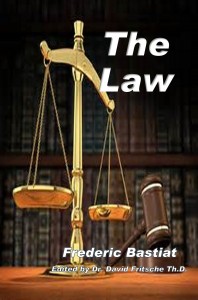 Bastiat starts at the beginning and weaves a simple and logical web to show that the individual has the right to personal possessions and wealth. He then shows how it becomes necessary for the individual to find protection by paying others for the task. Yet, he postulates that when the power to protect the individual goes beyond its expected limit, the government becomes the plunderer.
Bastiat starts at the beginning and weaves a simple and logical web to show that the individual has the right to personal possessions and wealth. He then shows how it becomes necessary for the individual to find protection by paying others for the task. Yet, he postulates that when the power to protect the individual goes beyond its expected limit, the government becomes the plunderer.
Frederic Bastiat. His short treatise on The Law is one of those brilliant works that was influential in the French Revolution, and was greatly influenced by the forming of The United States. Here is a brief yet important presentation of the thinking that both went into our formation but came out of it and influenced the world.

